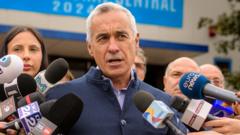Political analyst Radu Magdin remarked on the unprecedented nature of Georgescu's support, noting that pre-election polls had predicted a mere 5% of the vote for him. "This surge is unlike anything we've seen in our 34 years of democracy," he said. Georgescu, who previously condemned Romania's NATO missile defense installations, has received attention from Russian media, suggesting an affinity towards pro-Russian policies.
Despite having been expelled from George Simion’s far-right AUR party for his radical views, which included praise for Romania’s wartime fascist leaders, Georgescu has received Simion’s endorsement. This endorsement highlights a split in Romanian politics as millions face the dilemma of voting preferences in the upcoming run-off on December 8, particularly rural supporters of the Social Democrats who may struggle to back a more liberal candidate like Lasconi.
The campaign brought issues such as the rising cost of living and discontent over aid to Ukrainian refugees to the forefront, reflecting a public fatigue with socioeconomic challenges. The Romanian presidency, while largely ceremonial, plays a crucial role in shaping foreign policy, leading to significant implications for Romania's international stance. Voter turnout was reported at 51%, mirroring the participation from the previous election cycle, indicating consistent engagement from the electorate amid these shifting political tides.
Despite having been expelled from George Simion’s far-right AUR party for his radical views, which included praise for Romania’s wartime fascist leaders, Georgescu has received Simion’s endorsement. This endorsement highlights a split in Romanian politics as millions face the dilemma of voting preferences in the upcoming run-off on December 8, particularly rural supporters of the Social Democrats who may struggle to back a more liberal candidate like Lasconi.
The campaign brought issues such as the rising cost of living and discontent over aid to Ukrainian refugees to the forefront, reflecting a public fatigue with socioeconomic challenges. The Romanian presidency, while largely ceremonial, plays a crucial role in shaping foreign policy, leading to significant implications for Romania's international stance. Voter turnout was reported at 51%, mirroring the participation from the previous election cycle, indicating consistent engagement from the electorate amid these shifting political tides.





















